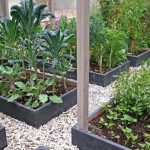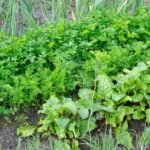Cottonseed meal is a popular organic fertilizer used in vegetable gardens. Many gardeners are drawn to its high nitrogen content and its ability to improve soil quality. However, there has been some debate over whether cottonseed meal is safe for use in vegetable gardens due to potential risks associated with its use.
Cottonseed meal is commonly used as a soil amendment and fertilizer for vegetable gardens. It is derived from the seeds of cotton plants after the oil has been extracted, making it an environmentally friendly byproduct. This natural fertilizer is known for its ability to improve soil structure, enhance microbial activity, and promote healthy plant growth.
One of the key benefits of cottonseed meal in vegetable gardens is its high nitrogen content. Nitrogen is essential for promoting lush green foliage and stimulating overall plant growth. Additionally, cottonseed meal contains other important nutrients such as phosphorus, potassium, and small amounts of micronutrients like calcium, magnesium, and sulfur. These nutrients can help support healthy root development and increase crop yield in vegetable gardens.
Benefits of Cottonseed Meal in Vegetable Gardens
Cottonseed meal is an organic fertilizer that can provide numerous benefits to vegetable gardens. The use of cottonseed meal can enhance the health and productivity of your plants, making it a popular choice for many gardeners. Here are some of the key benefits of using cottonseed meal in vegetable gardens:
- Slow-release nutrients: Cottonseed meal is a slow-release fertilizer, which means that it provides a steady supply of nutrients to your plants over time. This can help promote healthy growth and strong root development.
- High nitrogen content: Cottonseed meal is rich in nitrogen, which is essential for promoting leafy green growth in vegetables. Nitrogen is crucial for the production of chlorophyll, which aids in photosynthesis and overall plant vitality.
- Soil conditioning: In addition to providing essential nutrients, cottonseed meal can also improve the texture and fertility of the soil. It helps increase microbial activity and organic matter content, creating a more hospitable environment for plant roots.
Incorporating cottonseed meal into your vegetable garden can be a wise choice due to its nutrient profile and soil conditioning properties.
It should be noted that while there are many benefits to using cottonseed meal in vegetable gardens, it is important to use it properly. Over-application or incorrect application methods can lead to potential risks, as discussed in the following section.
Nutritional Content of Cottonseed Meal
Cottonseed meal is a byproduct of cotton production that is used as an organic fertilizer in vegetable gardens. It is a natural source of nutrients and has been widely used by gardeners to improve soil fertility and promote plant growth. Cottonseed meal is high in nitrogen, making it an excellent option for promoting lush foliage and healthy green plants in the garden.
In addition to nitrogen, cottonseed meal also contains other essential nutrients such as phosphorus and potassium, which are vital for overall plant health and development. Phosphorus plays a key role in root development, flowering, and fruiting, while potassium helps strengthen plants’ resistance to disease and stress. These nutrients work together to support the growth and productivity of vegetable crops in the garden.
When using cottonseed meal in vegetable gardens, it is important to consider its nutritional content and how it can benefit different types of vegetables. For example, leafy greens like lettuce and spinach may benefit more from the nitrogen-rich content of cottonseed meal, while fruiting vegetables such as tomatoes and peppers may require a balance of nitrogen, phosphorus, and potassium for optimal growth.
| Key Nutrient | Function |
|---|---|
| Nitrogen | Promotes lush foliage and healthy green plants |
| Phosphorus | Aids in root development, flowering, and fruiting |
| Potassium | Strengthens plants’ resistance to disease and stress |
Potential Risks of Using Cottonseed Meal in Vegetable Gardens
Cottonseed meal is generally considered safe for vegetable gardens, but there are some potential risks to be aware of when using this organic fertilizer. One risk to consider is the high levels of nitrogen in cottonseed meal, which can lead to an imbalance of nutrients in the soil if not properly applied. Excessive nitrogen can also result in rapid plant growth, leading to weak and vulnerable plants that are more susceptible to pests and diseases.
Another potential risk of using cottonseed meal is the presence of residual pesticides and herbicides. Cotton plants are often heavily treated with chemicals during cultivation, and trace amounts of these substances can remain in cottonseed meal even after processing. This can potentially harm beneficial microorganisms in the soil and impact the overall health of the garden ecosystem.
Additionally, cottonseed meal has a slightly acidic pH, which could affect the soil pH over time if used excessively. While this may not be a significant issue for certain vegetable crops, it’s important to monitor the pH levels in the soil to prevent any negative impact on plant growth.
| Risks | Impact |
|---|---|
| High Nitrogen Content | Imbalance of nutrients, weak plant growth |
| Residual Pesticides/Herbicides | Harmful effects on soil microorganisms, ecosystem health |
| Acidic pH | Potential impact on soil pH and plant growth |
Proper Application of Cottonseed Meal in Vegetable Gardens
Timing
When using cottonseed meal in vegetable gardens, it’s important to apply it at the right time. The best time to apply cottonseed meal is in the early spring before planting or at the beginning of the growing season. This allows the nutrients from the cottonseed meal to break down and become available for the plants when they need them most.
Application Rate
Determining the right application rate for cottonseed meal is crucial for its effectiveness and to prevent any potential harm to your vegetables. A general guideline is to apply 2-3 pounds of cottonseed meal per 100 square feet of garden area. It’s important to follow the instructions on the product label and avoid over-application, as this can lead to nutrient imbalances and negatively impact plant growth.
Incorporation
After applying cottonseed meal, it’s essential to incorporate it into the soil thoroughly. This can be done by lightly raking or hoeing the soil to mix in the cottonseed meal. Proper incorporation ensures that the nutrients are distributed evenly throughout the root zone, leading to better uptake by the vegetables.
Proper application of cottonseed meal in vegetable gardens is key to maximizing its benefits while minimizing any potential risks. By following these guidelines, gardeners can ensure their vegetables receive an adequate supply of nutrients from cottonseed meal without causing harm to their plants or soil.
Common Misconceptions About Using Cottonseed Meal in Vegetable Gardens
Many gardeners have heard of cottonseed meal as an organic fertilizer for vegetable gardens, but there are some common misconceptions about its use that can cause confusion. Here are some of the myths about using cottonseed meal in vegetable gardens:
1. “Cottonseed meal will attract pests”: One common misconception is that using cottonseed meal in vegetable gardens will attract pests such as squirrels, raccoons, or rodents. However, when used properly and in moderation, cottonseed meal can actually deter pests due to its strong odor and high nitrogen content, which can make it difficult for certain animals to dig up the soil.
2. “Cottonseed meal will burn plants”: Another misconception is that cottonseed meal can burn plants if applied incorrectly. While it is true that cottonseed meal is high in nitrogen and can be potent if over-applied, following the recommended application rates and mixing it thoroughly into the soil can prevent any potential burning of plants.
3. “Cottonseed meal is unsafe for organic gardening”: Some gardeners may believe that cottonseed meal is not suitable for organic gardening due to its origin as a byproduct of the cotton industry. However, organic cotton farming practices have evolved, and many types of cottonseed meal available on the market today are safe and approved for use in organic gardening.
By dispelling these misconceptions and understanding the proper usage of cottonseed meal, gardeners can confidently incorporate this organic fertilizer into their vegetable gardens for optimal plant growth and health.
Alternative Organic Fertilizers for Vegetable Gardens
Compost
Compost is one of the most popular and effective organic fertilizers for vegetable gardens. It is made from decomposed organic materials such as food scraps, yard waste, and manure. Compost improves soil structure, adds essential nutrients, and enhances the soil’s ability to retain moisture. Additionally, it promotes beneficial microbial activity in the soil, which contributes to the overall health of the garden.
Bone Meal
Bone meal is a great source of phosphorus and calcium, two essential nutrients for vegetable plants. It is made from finely ground animal bones and can be used as a natural fertilizer to promote healthy root development and improve overall plant growth. However, it’s important to note that bone meal should be used sparingly as excess phosphorus can lead to nutrient imbalances in the soil.
Fish Emulsion
Fish emulsion is another popular organic fertilizer that provides a good source of nitrogen, phosphorus, and potassium. It is made from fish byproducts and contains essential micronutrients that promote healthy plant growth. Fish emulsion can be applied directly to the soil or mixed with water for foliar feeding. Its fast-acting nature makes it an ideal choice for promoting quick growth in vegetable plants.
When considering alternative organic fertilizers for vegetable gardens, it’s essential to choose products that align with your gardening needs and preferences. Each type of fertilizer has its own set of benefits and considerations, so taking into account factors such as nutrient content, application method, and long-term effects on the soil will help you make an informed decision about which product best suits your garden’s needs.
Conclusion
In conclusion, cottonseed meal can be a safe and effective organic fertilizer for vegetable gardens when used properly. Its high nitrogen content and slow-release nature make it beneficial for promoting healthy plant growth and improving soil fertility. Additionally, its affordable cost and availability make it a convenient option for many gardeners looking to enrich their soil without synthetic chemicals.
However, it is important to be aware of the potential risks associated with using cottonseed meal, such as the presence of gossypol which can be toxic to certain animals and plants if not managed correctly. It is crucial to follow proper application guidelines, including mixing it thoroughly into the soil and not over-applying, in order to minimize any potential negative effects.
Ultimately, while cottonseed meal is a popular choice for many gardeners, there are alternative organic fertilizers available that may better suit specific gardening needs or preferences. By carefully considering the nutritional content, application requirements, and any associated risks, gardeners can make an informed decision about whether cottonseed meal is the right choice for their vegetable gardens.
Frequently Asked Questions
What Are the Disadvantages of Cottonseed Meal?
The disadvantages of cottonseed meal include its high content of nitrogen, which can lead to nitrogen burn if over-applied to plants. Additionally, it can contain residual pesticides and chemicals from the cotton growing process, posing a potential risk to the environment and human health if not properly managed.
Is Cottonseed Meal Good for Tomato Plants?
Cottonseed meal can be beneficial for tomato plants due to its slow-release nitrogen content, which promotes healthy foliage growth and overall plant vigor. However, it should be used sparingly due to its high nitrogen content, as over-application can lead to excessive leafy growth at the expense of fruit production.
Which Plants Like Cottonseed Meal?
Plants that thrive with cottonseed meal as a fertilizer include acid-loving plants like azaleas, rhododendrons, blueberries, and strawberries. It’s also beneficial for flowering plants such as roses, camellias, and gardenias due to its balanced nutrient profile and ability to improve soil structure over time.
However, caution should be taken with the application rates and frequency to avoid any negative effects on the plants’ health.

If you’re looking to get into vegetable gardening, or are just looking for some tips on how to make your current garden better, then you’ve come to the right place! My name is Ethel and I have been gardening for years. In this blog, I’m going to share with you some of my best tips on how to create a successful vegetable garden.





